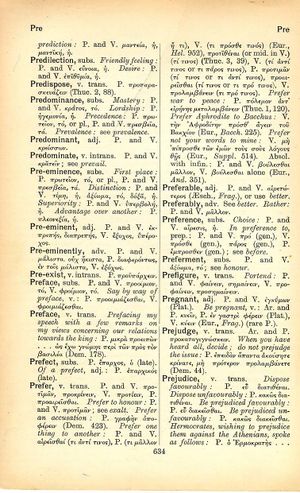prejudge: Difference between revisions
From LSJ
Δύναται τὸ πλουτεῖν καὶ φιλανθρώπους ποιεῖν → Being rich can even produce a social conscience → Animos nonnumquam humanos concinnant opes → Mitunter macht der Reichtum Menschen auch human
(CSV4) |
m (Woodhouse1 replacement) |
||
| Line 1: | Line 1: | ||
{{Woodhouse1 | {{Woodhouse1 | ||
|Text=[[File:woodhouse_634.jpg|thumb|link={{filepath:woodhouse_634.jpg}}]] | |Text=[[File:woodhouse_634.jpg|thumb|link={{filepath:woodhouse_634.jpg}}]] | ||
Ar. and P. προκαταγιγνώσκειν. | ===verb transitive=== | ||
[[Aristophanes|Ar.]] and [[prose|P.]] [[προκαταγιγνώσκειν]]. | |||
[[when you have heard all]], [[decide]]; [[do not prejudge the issue]]: [[prose|P.]] [[ἐπειδὰν ἅπαντα ἀκούσητε κρίνατε]], [[μὴ πρότερον προλαμβάνετε]] ([[Demosthenes|Dem.]] 44). | |||
}} | }} | ||
Revision as of 08:56, 20 May 2020
English > Greek (Woodhouse)
verb transitive
Ar. and P. προκαταγιγνώσκειν.
when you have heard all, decide; do not prejudge the issue: P. ἐπειδὰν ἅπαντα ἀκούσητε κρίνατε, μὴ πρότερον προλαμβάνετε (Dem. 44).

